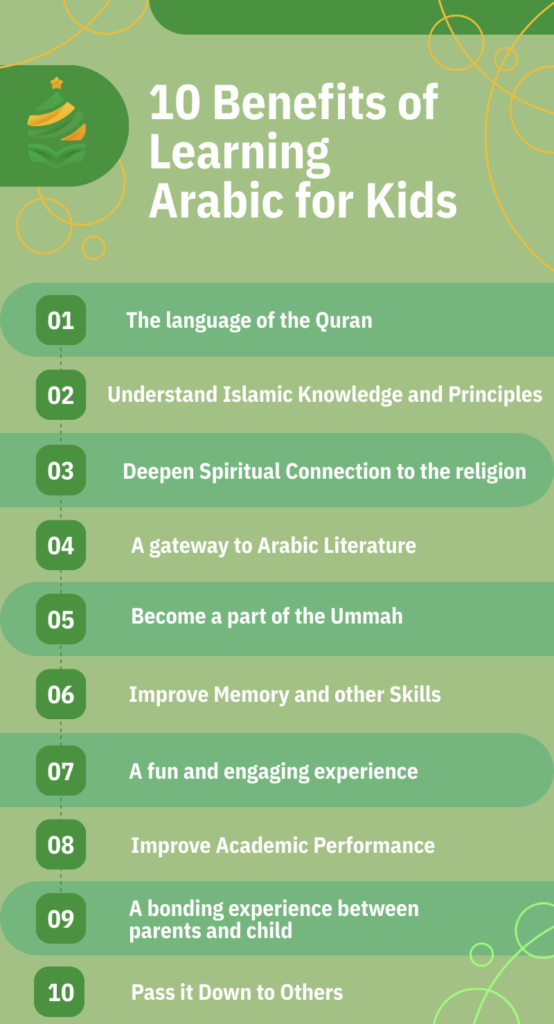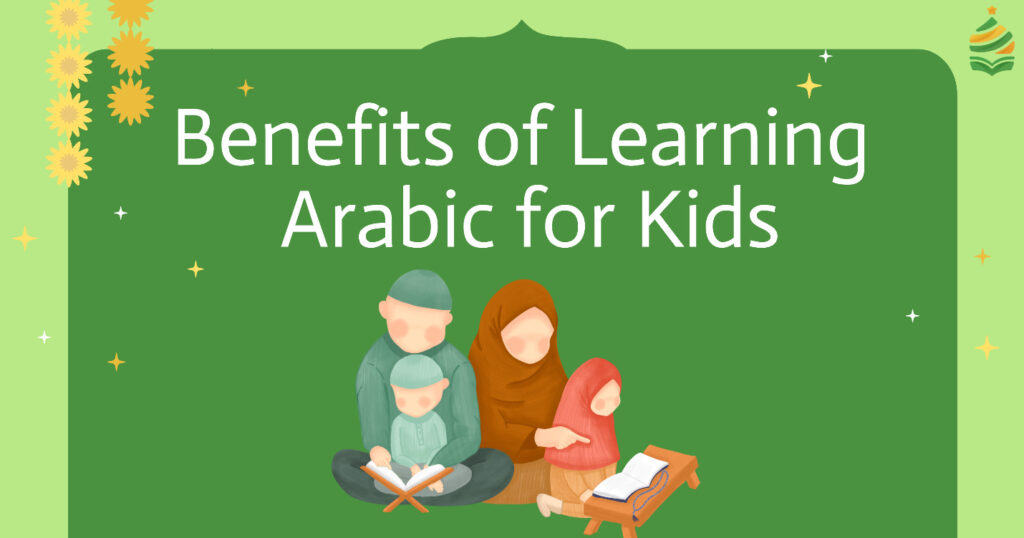Arabic, a language spoken by approximately 420 million people worldwide, holds immense significance in today’s globalized world. While many may perceive foreign languages as “cooler” to learn, the benefits of learning Arabic for kids extend far beyond mere trendiness. In this blog post, we will explore ten compelling benefits that make Arabic an invaluable language to acquire during childhood.
10 Benefits of Learning Arabic for Kids

1. The language of the Quran
Learning to read the Quran is the wish that many parents desire for their kids and since Arabic is the language of the Quran, learning the basic skills of this language such as reading, speaking, listening and writing is what guarantees the fulfillment of that wish. Teach children Arabic alphabets so that can understand how to read or pronounce them perfectly. Quran classes for kids are the best option for children who want to earn a Quran with perfect Quranic Arabic.
2. Understand Islamic Knowledge and Principles
Another significant benefit of learning Arabic for kids is the ability to understand Islamic knowledge and principles. By mastering the language, children can gain a deeper understanding of their faith and its teachings, which can shape their worldview and moral compass. Acquiring these skills can lead children to develop a more profound appreciation for their faith and its cultural significance.
3. Deepen Spiritual Connection to the Religion
Learning Arabic is one of the best ways to deepen your child’s spiritual connection to Islam. Not only does it help them to recite the Quran and to understand the teachings of Islam, but learning Arabic for kids allows them to practice Islamic rituals such as prayer and making duaa’ in Arabic following the tradition of the Prophet PBUH.
4. Gateway to Arabic Literature
Arabic is a rich and diverse language that has produced some of the world’s most significant literary works. Consequently, learning Arabic can give kids access to a vast array of literature, including poetry, fiction, and non-fiction. This provides them with a deeper understanding of Arabic culture and history and expands their literary horizons beyond their own native languages.
5. Become a part of the Ummah:
The concept of the Muslim Ummah is one that every parent should engrave in their offspring. To make this step easier, teaching your kids Arabic, which is the language of the Muslim community worldwide, can help them connect with fellow believers from different parts of the world. This promotes a sense of unity and solidarity within the Ummah that transcends national borders.
6. Improve Memory and other Skills:
In addition, what comes with learning a new language is a bunch of benefits to your child’s brain since it has been shown to improve cognitive function, memory, and problem-solving skills. It also enhances creativity, critical thinking, and multitasking abilities. These skills are also quite beneficial for your kids’ academic performance, personal development, and career advancement.
7. Fun and Engaging Experience
One of the major concerns for parents when their kids are learning Arabic is that it could get tedious and boring for them. On the contrary, learning Arabic can be a fun and engaging experience for kids, especially through the use of interactive resources such as games, songs, and videos. As a result, your kids will actually look forward to the next time they learn Arabic to understand Quran.
8. Improve Academic Performance
In multiple ways, Arabic proficiency can improve academic performance. It also provides a competitive edge in the job market, especially in fields related to international relations, diplomacy, and translation. This enhances children’s future prospects and opens up new opportunities for personal and professional growth.
9. Bonding Experience Between Parents and Child
A common phenomenon that is present in modern families is the weakening ties between parents and their children. One of the ways parents can combat that is through teaching Arabic to their kids. This can be a bonding experience between them providing an opportunity for shared learning and fostering a deeper connection between parent and child. This can have long-lasting benefits for the parent-child relationship and promote a positive family dynamic.
10. Pass it Down to Others
By learning Arabic, kids can pass down their knowledge to others, including their siblings, peers, and future generations.
Join Al Muhammadi Academy
If you are considering enrolling your child in an Arabic language course, Almuhammadi Academy should be your destination. Our Arabic course for kids is designed to establish a strong foundation in Arabic for children, enabling them to further enhance their faith and knowledge.
To learn more about our courses, please visit our website or contact us today. Enroll your child in an Almuhammadi Academy Arabic course today and give them a lifelong gift!
Important FAQs
1. What is the best age to teach a child the Arabic language?
The best age to teach a child the Arabic language is from a young age, ideally between the ages of 3 and 7. This is because children’s brains are more receptive to language acquisition during this period, and they can learn Arabic more easily and naturally. However, it is never too late to start learning Arabic, and children of all ages can benefit from language instruction.
2. How can we make learning Arabic fun and interesting for kids?
There are several ways to make learning Arabic fun and interesting for kids:
- Use interactive resources like games, songs, and videos
- Make it relevant by using Arabic vocabulary and phrases from everyday situations to help kids see the practical applications of the language.
- Encourage creativity: Encourage kids to express themselves in Arabic through storytelling, drawing, or other creative activities.
- Make it social: Help your kids to practice their Arabic skills with peers or native speakers

